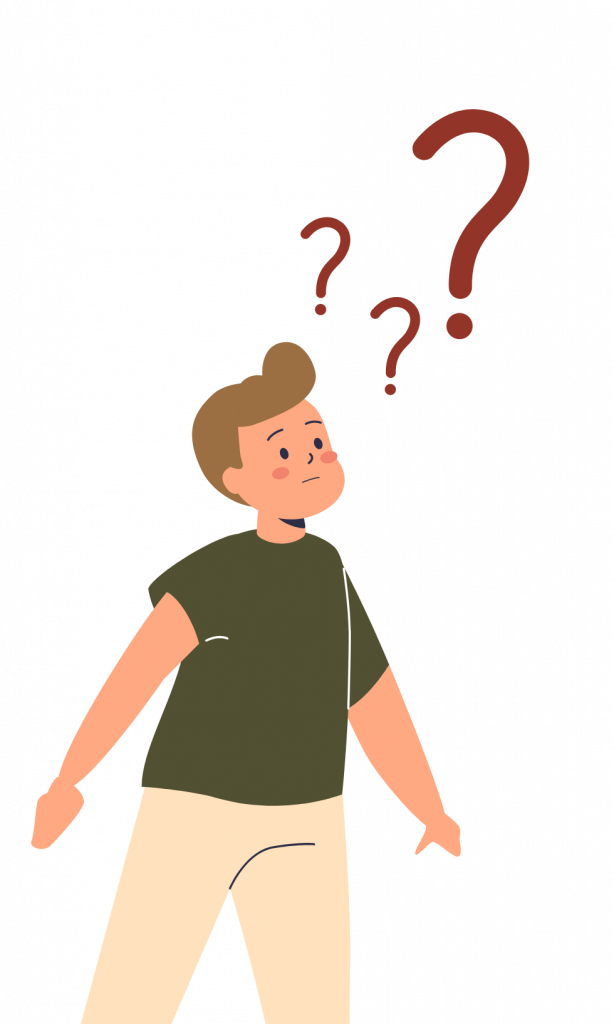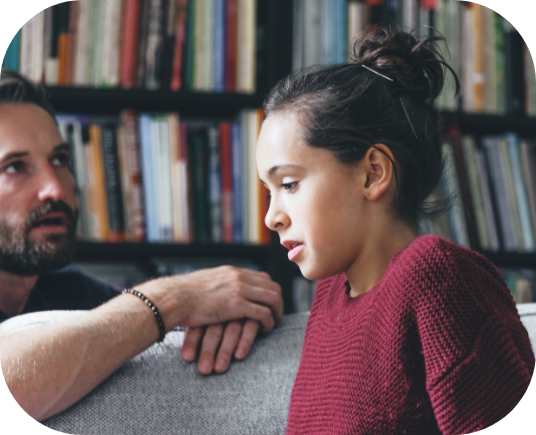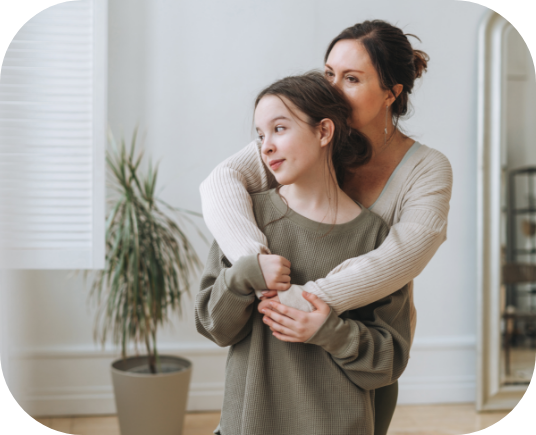

Anxiety
What Is Anxiety?
We all feel nervous or scared from time to time; it is a natural reaction to the unknown. Anxiousness is a normal part of life. It helps to protect us from dangerous situations. Anxiety becomes a problem when the worrying does not shut off and it starts to hinder a person’s life. Anxiety disorders are like a tape recorder that plays on repeat in a person’s head. Anxiety disorders have extreme fear, worry, and behavioural changes as a response to the fear. Anxiety is the constant wonder of “what if?”; “What if this happens?” …. “What if that happens?”. This feeling of “what if” is about something in the future. Fear is about a current threat, whether it is real or sensed.
Myths / Facts
FACT – Anxiety disorders are real. They are not just something a person can turn off.
If someone has not struggled with an anxiety disorder, they often think it is something a person can just shut off. That is the hard thing about mental health issues; is not something that someone can see so they assume it is not real or serious. Anxiety disorders are real, and they affect a person’s ability to do the things they need to during the day. They can cause the person to have a seemingly over-the-top reaction to something that triggers them. It can be hard for the person to explain their reaction or anxiety. No one has a switch to turn off their emotions. It is the same with anxiety. A person with an anxiety disorder cannot just decide to stop having an anxiety disorder. Their experience is valid.
FACT – Anxiety disorders have similar symptoms, but they are not the same.
While different anxiety disorders have similar feelings, they are not all the same. Each anxiety disorder is affected by different things. For example, someone with generalized anxiety disorder is not triggered by anything specific whereas social anxiety is triggered by social situations. Anxiety disorders are different for everyone. Two people with the same disorder could have different experiences, symptoms, and severity.
FACT – Children can be impacted by anxiety, too. Anxiety disorders can impact anyone of any age.
This is a common misunderstanding. People often think children and youth cannot struggle emotionally, but that is not true. It can be tricky because children who have anxiety are often quiet and well-behaved, so people do not notice. The child does not want to stand out. There are some kids who act out when they are struggling with anxiety which can also mean they do not get the help they need and deserve.
It is important to connect with help when struggling with anxiety. If anxiety goes untreated, it can become worse, and the person may miss out on very valuable opportunities.
FACT – There are many types of treatments that can help treat anxiety.
There are many different types of treatments for anxiety disorders. The two main types of treatment are therapy and medication. Therapy can help the person learn skills to deal with their symptoms. There are also different types of medications that help with the symptoms of anxiety. It all depends on the type of anxiety disorder the person has as well as other factors.
There are also other things that can be used to help manage the symptoms of anxiety. Developing a healthy lifestyle can help support mental health.
More tips for managing anxiety:
- Eat well and be active. To be healthy, we must take care of our bodies too. Exercise helps to reduce stress. Practice moderation.
- Relaxation techniques
- Avoid smoking, caffeine, alcohol, and recreational drugs
- Get enough sleep. Sleep helps with regulating emotions. Lack of sleep makes us more vulnerable and sensitive to stress.
See below for more wellness tips.
FACT – Everyone feels anxious from time to time, but not everyone has an anxiety disorder.
Anxiety is a part of life. The nervousness or anxious feelings are experienced by everyone. The cause of the anxious feelings is usually the result of a change or challenge in the environment, whether good or bad. This makes it tricky when talking about anxiety, but there is a difference between anxiety and anxiety disorders. Everyone has anxiety (feels anxious) periodically, but not everyone has an anxiety disorder. Anxiety disorders start to interfere with life and wellness.
FACT – Healthy coping skills help to support positive mental health, but it will not cure anxiety disorders.
A healthy lifestyle can help deal with the symptoms of anxiety. Exercising, sleeping, eating well, relaxation techniques, and hobbies can help to reduce stress and promote mental wellness. This does not cure anxiety. While eating well and cutting caffeine can help anxiety, it will not make anxiety disappear. It is about learning how to deal with the symptoms, finding a treatment that works for the individual, and asking for help when needed.
FACT – Social anxiety and shyness are different.
There is a common belief that social anxiety is someone being shy. That is not the case. Shyness is not a disorder. It is a personality trait. There are some people who are shy and have social anxiety, but that is not the case for everyone. Not everyone who is shy has social anxiety, and not everyone who has social anxiety is shy. There are people with social anxiety disorder who like to be around many people and the center of attention once they overcome their social anxiety. Many people who are shy do not view their shyness poorly. People with social anxiety disorder find it upsetting.

Generalized Anxiety Disorder
Generalized anxiety disorder is constant worrying. The worrying/anxiety is difficult to control. The person may have anxiety about daily tasks. Compared to others, people with Generalized Anxiety Disorder (GAD) worry more often.
Their worries could include but are not limited to:
- Being on time
- School
- Small Decisions
- Relationships
- Personal Health
- Health of someone they care about
- The future
- The state of the world
What could feel like a little thing to others might send the person spiralling into a state of worry. Their brain might start “chaining” worries. This means they could start with one worry which leads to the next one to the next.
For example, there is a test on Monday. A person with anxiety might start thinking:
- “What if I fail this test?”
- “What if my parents get mad and start fighting because I failed my test?”
- “What if my parents get a divorce?”
- “What if one of my parents has to move out and I never see them again?”
Panic Disorders
Panic disorders are characterized by recurring panic attacks. Panic attacks are one of those things people will sometimes use to describe worrying, but that is not quite a panic attack. Panic attacks are more than feeling worried or apprehensive. They can be triggered by certain things or seemingly come out of nowhere. If someone has one panic attack, that does not mean they have panic disorder. It becomes problematic when the individual is worried or anxious about having more panic attacks.
Phobias
Phobias are fear about a certain thing (situation, event, object, animal, etc.). The level of fear is overwhelming and amplified compared to the actual level of danger. It is more severe and long lasting than feeling nervous or anxious about something. They can affect how a person functions in their daily living.
Some of the most common phobias are:
- Situations
- Nature
- Animals
- Blood
- Others

Social Anxiety
Social anxiety, also known as social phobia, is when a person experiences anxiety or fear in relation to social situations (National Institute of Mental Health). The fear is around certain or all social situations (talking in class, dating, meeting new people, doing things in front of people, etc.). The anxiety feels uncontrollable. The worry can last days or weeks before the event even happens. They might replay interactions or incidences repeatedly in their head. The person might also feel physical symptoms during social interactions.
A person with social anxiety could be triggered by the following (Mayo Clinic):
- Meeting new people
- Attending social gatherings
- Going to work, school, grocery store, etc
- Eating or drinking in front of people
- Starting conversations
- Eye contact
- Dating
- Returning items to a store
- Asking for help
- Answering a question in class
- Using a public restroom
Obsessive-Compulsive Disorder
Obsessive-compulsive disorder (OCD) is an anxiety disorder which is characterized by a pattern of distressing thoughts and fears (Mayo Clinic, 2020). These obsessions lead to compulsions which are repetitive behaviour. This can cause significant distress and often interferes with daily tasks and activities.
There is a common belief that OCD is simply being neat and tidy. That is not the case. While a person with OCD might make things orderly, it is not just because they like it that way. OCD makes the person feel very stressed or as if something bad will happen if things are not orderly. If the person tries to ignore the obsessions and compulsions, they become worse. The anxiety becomes more severe.

Obsessions could have the following themes (Mayo Clinic):
- Unwanted thoughts
- Needing things to be neat and orderly
- Difficulty with the unknown
- Fear of dirt, germs, or contamination
- Violent thoughts about losing control and hurting self or others
Compulsions could have the following themes (Mayo Clinic):
- Orderliness
- Checking things (locks, taps, oven, etc.)
- Strict routine or schedule
- Cleaning and washing
- Counting
- Need for reassurance

Separation Anxiety Disorder
Feeling anxious about being separated from loved ones is a natural reaction in young children (between 18 months and 3 years of age). If the anxiety persists and gets worse, it might be a separation anxiety disorder. The anxiety is usually about being separated from a parent or caregiver. Separation anxiety disorder is not only for children. It can impact teenagers and adults. This can cause problems in going to work, leaving the house, going to school, etc.

Causes of Anxiety
Like any mental health concern, the cause is not simple. Everyone has a different story. The causes of anxiety are not entirely known, but there are some risk factors. Some people are more likely to develop anxiety than others. There are other factors that can put a person at a higher risk, including:
Risk Factors of anxiety:
- Excessive stress
- Different personality types
- Substance use (substances can worsen symptoms)
- Medical problems
- Medications
- Having another mental health disorder
- Traumatic events
- Family history
As with any mental health disorder, it is important to remember that it is not the person’s fault. It is not a personal flaw.
What Does Anxiety Look Like?
Anxiety could look like:
- Restlessness
- Being easily tired or having issues with sleep
- Mind blanking
- Difficulty concentrating
- Moodiness
- Perfectionism
- Hate or strong dislike of the unknown, so they are constantly looking things up, seeking reassurance, etc.
- Avoiding making decisions
- Cancelling plans
- Physical symptoms (headache, stomachache, tiredness, difficulty breathing, muscle tension, etc.)
- Feeling overwhelmed or out of control
- All or nothing thinking


What to Do if You Are Struggling With Anxiety?
Struggling with anxiety can be a very challenging thing. It can feel very lonely. What can you do if you are struggling with anxiety?
- Remember, it is okay not to be okay. Everyone has hard times. It takes a very strong person to admit they are not doing well. It is about seeking help when you are not doing well.
- Tell someone you trust. Find someone you trust who will help you connect with help. You deserve to feel better and get help!
- Take care of yourself. Make healthy choices for your mental health and practice positive coping skills. Find people who support you.
- Remember, you’ve got this!
What Do You Do if a Friend Tells You They are Struggling?
When a friend or loved one tells you they are struggling, it can be tricky to know what to say. We want our loved ones to be okay, but there will be times when they are not doing well. It can be hard to know what to say. We often want to solve their problems and give them advice, but that is not your job. Your job is to connect your friend with a helping professional.
The following are some guidelines as to what to do if someone tells you they are struggling. This is not to counsel the person – this is to get the person connected with a counselor, doctor, or another professional. Please remember the conversation will not be linear, as it looks on the page. These are guidelines of some things to consider.
- Take a deep breath and stay calm. The person is telling you something scary and personal to them. This is terrifying for both of you. Take a deep breath. When we care about someone and they tell us about their struggles, we sometimes react with what seems like anger. This is often an outward display of fear which comes across as anger. This can make it difficult for the person to open up to you. Take that moment to gather yourself and take a deep breath. Remember: this is about them and their experience.
- Listen to the person. Give the person the time and consideration you would like if you were struggling. Be the person you would like supporting you in a situation like this. Give them your full attention. They deserve it. It will also help you know what the person is trying to tell you. While you are listening, be understanding and compassionate. Give them the space to talk.
- Do not judge your friend. What they are coping with might not seem like a big deal to you, but it is to them. Therefore, it is valid.
- Do not interrupt your friend. Being interrupted is very frustrating. It can make the person feel like they are not being heard.
- Put your phone down! Have you ever talked to someone who is on their phone, and they don’t hear a word you say? It can be very frustrating. Treat your friend with the respect they deserve.
- Be the best friend you can be and the person you would like if you were in this situation.
Separation Anxiety Disorder
- Help the person decide who to tell and support them in seeking help. Your loved one needs to get help. This is not something you can deal with without professional help. Help the person think of someone they trust and who they would like to talk to about their struggles. If they feel like they cannot think of anyone to talk to, help them connect with resources like a counselor, medical doctor, psychologist, or mental health professional. You can also offer your loved one some helplines they can call when they are struggling too. If you are comfortable, you can also offer to go with your loved one to get help. If your loved one does not connect with the first person they see, try someone else. Not every counselor is for every person. Just keep trying. There is someone out there who your loved one will connect with!
- Do not keep it a secret. If your loved one asks you to keep it a secret, you cannot keep it a secret. There are three incidents where you break someone’s confidence.
- They are going to harm themself.
- They are going to harm someone else.
- They are being harmed by someone.
You can tell someone that based on what they have said, you must tell someone to get them help.
- Get help for you, too. Talking about mental health concerns is challenging. Talk to someone about it to help cope with the stress of the situation. Practice self-care. Do something you enjoy. For self-care ideas, visit the self-care section here.
Please remember, if someone you know dies by suicide, it is not your fault. It is a choice they made. Please get help for yourself. It is important you talk to someone and get help for yourself.

Follow-up Support for Someone with Anxiety
- Be understanding
- There are times when the person might cancel plans, are not feeling well, or need a break.
- Support your friend in making healthy choices
- Your friend might have to make some changes to support their mental health. Support them in making healthy choices.
- Give your friend a choice of helplines to call when they need someone to talk to
- Have fun with your friend!
- Understand some of your friend’s reactions could be due to their anxiety
- Practice boundaries
Things to Avoid
- Gossiping about your friend’s mental health
- Telling your friend to quit worrying
- Telling them how to feel
- Acting as your friend’s counselor
- Telling your friend what to do

Tips for Wellness
There are many things you can do to support your wellness. The following activities can help you support your mental health and manage anxiety symptoms. It is important to also seek professional help.

- Adopt a healthy lifestyle
- Eating well, being active, and getting enough sleep is an important part of promoting mental health.
- Eating well helps your brain and body have energy and the capacity to function.
- Being physically active is a wonderful way to reduce stress by increasing feel-good hormones in the body.
- Sleep is an important part of emotion regulation and the ability to problem-solve. Think of a time when you had not had enough sleep and you had a hard time thinking clearly or your emotions felt like a rollercoaster. Sleep is very important to your overall health.
- Avoid caffeine, alcohol, and other illicit drugs
- While it may feel like these things help you to relax in the moment, they increase the feelings of anxiety and paranoia with some increasing anxiety immediately and others causing the increase over time.
- Practice relaxation techniques, like deep breathing, mindfulness, or meditation
- Have fun
- Connect with others
- Ask for support
- Get to know your anxiety and what triggers it
- Find what works for you
- For other ideas, please check out the wellness sessions here.
Further Resources
Anxiety disorders – Diagnosis and treatment – Mayo Clinic
Anxiety disorders – Symptoms and causes – Mayo Clinic
Anxiety Disorders (for Teens) – Nemours Kidshealth
Anxiety Happens: It’s Not a Choice | Psychology Today Canada
Anxiety in Children – Anxiety Canada
Anxiety: Causes, Symptoms, Treatment, and More (healthline.com)
Do I have anxiety or worry: What’s the difference? – Harvard Health
Emotion, emotion regulation and sleep: An intimate relationship (nih.gov)
Mood and anxiety disorders in Canada – Canada.ca
NIMH » Anxiety Disorders (nih.gov)
Obsessive-compulsive disorder (OCD) – Symptoms and causes – Mayo Clinic
Separation Anxiety – Anxiety Canada
Social Anxiety Disorder – Anxiety Canada
If you would like to speak to someone about mental health issues, the Alberta Health Services Mental Health Help Line is available 24/7, offering information and referrals on any aspect of mental health.
Call toll-free: 1-877-303-2642
Other Topics to Consider
Accidental Overdose
Accidental Overdose What Is it? An overdose is what happens to someone’s body when they take too much of a substance or too many substances.
Online Relationships
Online Relationships Tips for Being Safe Online: Do not talk to people you don’t know online Remember what you post online is there forever (even
Dimensions of Health
Dimensions of Health How do you feel when you wake up on your best day? You probably feel well-rested. You probably wake up to a
Relationships
Healthy Relationships Qualities of Healthy Relationships Respect is to treat others the way you want to be treated, be considerate, honour someone’s feelings and opinions.

